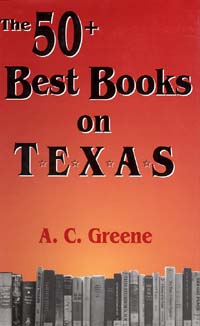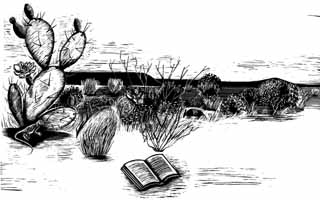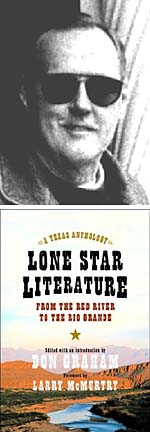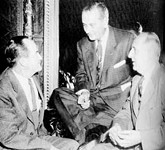Making Lists
By Dick Holland, Fri., Jan. 1, 1999
-- Strangers on a Train, by Patricia Highsmith
"Texas has no serious writers. I am the first serious writer Texas has produced."
-- Katherine Anne Porter to Winston Bode in The Texas Observer, October 31, 1958.
"Every man has a village in his heart, whether he comes from abounding Manhattan or the prairies of West Texas. It may be a crossroads town where every face was a daily familiarity, it may be one certain block within a metropolis, but there is a village he has kept. The village is what he refers to when he is making his life decisions. When he cannot go back to the village and display his prizes, in pride or in scorn, he finds less satisfaction in achievement. He does not always love the village but he can never destroy it, for it is himself in it that makes it his village."
-- A.C. Greene, from A Personal Country
 |
The 50+ Best Books on Texasby A.C. Greene |
That these particular lists were stinkers seemed almost irrelevant. Cultural consumers hadn't had so much fun in years, first demonstrating how dim these compilations were, and then how much better the lists would be if only their suggestions were followed. About this time came the announcement that A.C. Greene's The 50+ Best Books on Texas was being reprinted, and I was delighted: This is our very own flawed list and after all, there is nothing hotter than arguments about pecking orders in the provinces. But now the book is out and its reception has been almost total silence -- an eloquent silence that demonstrates how much the content and context of Texas lit has changed during the last 15 years.
A.C. Greene, along with Americo Paredes, was recently honored with a lifetime achievement award at the Texas Book Festival. This was appropriate recognition of his important role in Texas literary matters, as a memoirist, fiction writer, and influential book critic in Dallas. Greene's book began as a "best of" magazine piece for Texas Monthly back in 1981. The list was stubbornly old-fashioned -- the books listed had an average publication date of 1953 -- but it did remind us of a number of Texas classics that had stood the test of time. Still, it likely would have sunk without a bubble had it not been for Larry McMurtry. A few months after the Texas Monthly list appeared, McMurtry managed to solidify his reputation as the state's smartest literary opinionator with a brilliant and mean-spirited essay in The Texas Observer, titled "Ever a Bridegroom." "Bridegroom" was a brutal assessment of the talent in the room and demonstrated that with a few exceptions, McMurtry didn't think much of either the talent (his writing colleagues) or the room (Texas). Among his elders, he was particularly brutal to Katherine Anne Porter, attaching to her the fatal stylistic descriptor "genteel," and he just buried J. Frank Dobie, having gravely wounded him in his 1968 collection of essays In a Narrow Grave. Among those surviving his cold-eyed assessment were John Graves, whom McMurtry identified as much more than a rustic nature writer, Austin novelist Bud Shrake, and a group of McMurtry's bad-boy contemporaries: Max Crawford, James Crumley, Dave Hickey, and John Irsfeld. McMurtry even objected to his own work being included in Greene's pantheon, referring to Horseman, Pass By and Leaving Cheyenne as "juvenalia."
McMurtry's intemperate blast knocked the barnacles off the old, listing boat of Texas lit and this proved to be therapeutic. Soon there were rejoinders, literary conferences devoted to the topic, and all across the land commentators were stirred up with the question, "What Hath Larry Wrought?" A valuable book emerged from this dustup, one that now seems almost quaint in its earnestness. This extended exercise in navel-gazing was 1989's Range Wars: Heated Debates, Sober Reflections, and Other Assessments of Texas Writing. It brought together Greene's original list, McMurtry's "Bridegroom," plus eight additional essays by other contributors to this debate that by 1989 was already beginning to peter out.
University of Texas professor Don Graham, in his piece, transferred the old American lit dichotomy of Paleface/Redskin (Henry James vs. Mark Twain) to Texas, and characterized literary Texas imports as "fern bar writers." This appeared to raise some hackles at the University of Houston's Creative Writing program, thus demonstrating that Yankee writers can be as thin-skinned as our local products. Other lively comments came from Celia Morris, who made some politically correct points while plaintively describing what it was like to cohabit with good old boy Texas writers (by then she was Willie Morris' ex-wife); Tarleton State professor Tom Pilkington chimed in by countering McMurtry's condemnation of Texas lit by sensibly declaring that it was too young to be a failure.
What really dates Range Wars are University of North Texas professor Jim Lee's search for a Texas literary arbiter to fill Dobie's shoes and a mopey piece contributed by Denton writer Clay Reynolds based on his perception that the Austin/San Antonio literati hog all the glory. Looked at now, the objects of Reynolds' paranoia have all but disappeared: The Texas Monthly mafia has disbanded, most of the promising Austin fiction writers have quit to vie with each other for screenwriting gigs, and serious writing of most kinds in this part of the world has moved to the newly established creative writing programs in Austin and San Marcos.
As to Jim Lee's arbiter, more in line with the times than a single successor to Dobie are the bookstores, museums, libraries, and committees that promote Texas writing. Sophisticated programs such as Arts & Letters Live at the Dallas Museum of Art and Copyright Texas at the San Antonio Public Library have applied a glossy sheen on Texas literature as performance, and bookstores in Austin alone sponsor hundreds of book signings a year, a phenomenon unknown just a few years ago. Anonymous committees plan big events such as Texas Writers Month and the Texas Book Festival, and to succeed, on some level they approach writing as a commodity, with the associated concerns of image, product advertising, and presentation. With a few exceptions, literary books and careers that slowly build, book by book and over the years, are things of the past, dead and gone.
A.C. Greene's village is a metaphor for his generation of Texas writers. His literary generation followed that of J. Frank Dobie and Katherine Anne Porter -- many of them remained in Texas and knew each other, and through the clubby environment of the Texas Institute of Letters, they set standards and rewarded good works, particularly those that were in the tradition of the non-experimental novel, the carefully wrought essay, and the well-designed book. But now things have changed again; Greene's generation is collecting end-of-career honors and perhaps it is time to look at this whole business for what may be the last time.
Texas lit ranges from the
writing cowboy Andy Adams to mystery meister Tom Zigal, from the arch-conservative mindset of J. Evetts Haley to the brilliant riffs of Dave Hickey, and from the native-born and never-strayed to the irreplaceable contributions of writers from elsewhere who move here and write about it. Of the three identifiable regional literary camps in the southern half of the U.S. (New Mexico, the South, and Texas), what differentiates us from the other two is that, for the most part, we're restless and they're not.
Our traveling prototype is McMurtry, who has written wherever his automobile wheels have taken him, portable typewriter and canary yellow paper in tow. Like Nabokov composing Lolita, the legend of Larry has him writing Lonesome Dove in motel rooms as he drove from Washington, D.C., to Texas to L.A. and back. His novel Cadillac Jack is as infectious a road novel as any in American lit. Both the book scout and the itinerant Texas writer can share Cadillac Jack's mantra: "Anything can be anywhere."
This being the case, I'm inclined to open the criteria for Texas lit up to (1) natives who stayed; (2) natives who left and maintain even a modicum of regional identity; (3) imports who come and stay awhile and write about our place; and (4) imports who come for a while and move as long as they leave something behind. I guess the line must be drawn someplace and one place would be Fort Worth native Patricia Highsmith, who moved to England at an early age and went on to write several well-regarded thrillers. Taking credit for Strangers on a Train, no matter how much we'd like to, is an act of hubris beyond even the most chauvinistic Texan.
On the other hand, I see no problem in embracing writers as diverse in talent and place as Max Apple, Donald Barthelme, Sarah Bird, Sandra Cisneros, James Crumley, Laura Furman, Dagoberto Gilb, Albert Goldbarth, William Hauptmann, John Irsfeld, Mary Karr, Beverly Lowry, Willie Morris, Carolyn Osborn, Terry Southern, Jim Thompson, Stanley Walker, and Marion Winik, none of whom make A.C.'s listing. All have meaningful Texas connections although they also could be claimed by Los Angeles, Detroit, Chicago, Manhattan, Brooklyn, Las Vegas, Mississippi, Missoula, New Jersey, and Albuquerque. Terry Southern, a rolling hipster, journeyed from his hometown of Alvarado to New York to Paris to London, where he hung out with William Burroughs, George Plimpton, Stanley Kubrick, Peter Sellers, and the Rolling Stones, keeping his Texas roots in vivid relief all the while. To verify Southern's credentials, check out the Slim Pickens character in his screenplay for Kubrick's Dr. Strangelove: Or How I Learned to Stop Worrying and Love the Bomb.
Greene does acknowledge the gifted generation of writers that followed Katherine Anne Porter and Dobie: notably William Owens, William Humphrey, William Goyen (the three East Texas Williams), Larry L. King, John Graves, Bill Brammer, and Bud Shrake. Of these, the last three left the state and returned and the first four left early, prospered in the East, and never permanently came back. So if Marion Winik has become the voice of Austin on NPR, does that make her more of a Texan than Larry L. King, who left the state in 1954? In some ways the answer would have to be yes, although the mark of New Jersey is as deeply imprinted on Winik as is the stigmata of Midland on King. The gratifying fact is that Winik made Austin her place as much as King kept it his, and so it belongs to them both. A more subtle question could address the cultural citizenship of Donald Barthelme, the last and perhaps greatest American proponent of literary modernism in the practice of the short story. To those aware of his upper middle class background in Houston in the Forties and Fifties (his father was a modernist architect) it might come as no surprise that his literary persona became identified with New York experimentalism, but to the uninitiated, this apparent geographical dysfuction is as surprising as Robert Rauschenburg hailing from Port Arthur. Everybody's got to be from someplace, as the saying goes, and when Barthelme died several years back, one of his New York literary compères, Susan Sontag, remarked that what most marked Barthelme was his "Texanness."
To publish a novel in Texas or even a few is a sure ticket to literary obscurity. With the exception of some romance and genre novelists, the only commercially viable Texas fiction writers are the beloved Elmer Kelton and the bestselling Larry McMurtry and Cormac McCarthy, who, after all, were not household names until Lonesome Dove and All the Pretty Horses hit big. In 50+ Greene lists a number of forgotten novels by the likes of Philip Atlee, Al Dewlin, and Madison Cooper, the Proust of Waco, whose massive Sironia, Texas is usually designated as the longest novel in English.
In all fairness, Greene does list a number of viable and still-read novelists, including Bill Brammer, Fred Gipson, William Humphrey, Elithe Hamilton Kirkland, Tom Lea, George Sessions Perry, and Bud Shrake, although there are serious questions about his selections for some of these worthy writers. I would certainly add Shrake's Strange Peaches, Humphrey's Home From the Hill and The Ordways, and Gipson's classic tearjerker Old Yeller. The University of Texas Press has recently reprinted both The Gay Place and Blessed McGill, but this is an exception. A more telling indicator of the discouragement that faces Texas novelists is a list of the many gifted novelists of the last 15 years who continue to go shamefully out of print. This list of talent, all in their writing prime, would now include Sarah Bird (Alamo House), Max Crawford (Lords of the Plain), Steve Harrigan (Jacob's Well), William Hauptmann (Storm Season), Jan Reid (Deerinwater), Clay Reynolds (Agatite), Allen Wier (Blanco), and some talented lesser-knowns such as Sarah Glasscock and the neglected Houston comic writer Michael Zagst. A number of these writers have pretty much forsaken the novel for other more remunerative pursuits related to television or movie scriptwriting, and who can blame them, with the lack of support from publishers and what should be younger readers who in actuality read very little. A glaring omission from 50+ is Cormac McCarthy, who has brought serious literary attention to his chosen fictional land of far West Texas and Mexico and who evokes that hard landscape in the language of Faulkner, Joyce, and the Old Testament. Worse is Greene taking out Texas native Katherine Anne Porter, our state's greatest literary diva, whose Pale Horse, Pale Rider should be on everyone's list of great American books.
"Genre" as a descriptor tends to be demeaning, and I am of the school that believes that well-crafted detective fiction often tells us more about where we are and what we have become than more purely "literary" work. Of the Texas natives, James Crumley and David Lindsey are the big names. Crumley's violent yet meticulously moral hard-boiled heroes are very much in the tradition of Chandler and Ross McDonald and Lindsey's evocations of Houston in A Cold Mind, Heat From Another Sun, Spiral, and Mercy create a noir landscape that rivals those of Chandler and Ellroy in Los Angeles. Hill Country cosmic cowboy Kinky Friedman and naturalized Texan Mary Willis Walker are our crime fiction missionaries to the world, garnering huge readerships and prizes. The genre-busting creations of Neal Barrett Jr. and Joe Lansdale are lurid, shocking, funny, and better-written than 90% of anything else on this or A.C.'s list.
The short story is the form in which Texas writers have always distinguished themselves. Beginning with the Porters, William Sydney (O. Henry) and Katherine Anne, Texas story writers have demonstrated a mastery that actually does place them in company with their southern and New Mexico peers. Rick Bass's The Watch, Rick DeMarinis' The Voice of America, Dagoberto Gilb's The Magic of Blood, William Hauptmann's Good Rockin' Tonight, and Pat Ellis Taylor's Afoot in a Field of Men all rank among the best American story collections published in the last 20 years. The richness of talent can be seen at its most diverse in several excellent anthologies of Texas short fiction. Still the best is Don Graham's South by Southwest: 24 Stories From Modern Texas. This volume brings together several generations of Texas talent, including Greene, Humphrey, Hickey, McMurtry, Zigal, and Pat Ellis Taylor as well as Hughes Rudd, Osborn, Naomi Shihab Nye, Peter LaSalle, and William Harrison. James Crumley's near-perfect story "Whores" alone is worth the price of admission.
|
|
A.C. Greene's A Personal Country is a fine book about West Texas, and Greene is on firmer ground in 50+ when he discusses nonfiction. Olmsted's A Journey Through Texas, Webb's The Great Plains, Bedichek's Adventures With a Texas Naturalist, and especially John Graves' Goodbye to a River provide an excellent start for anyone interested in classic Texas writing. That Greene once again is somewhat immune to recent or out-of-the-way developments is demonstrated by his omitting our best two memoirs, North Toward Home by Willie Morris and Mary Karr's bestselling The Liar's Club. Equally puzzling is the omission of a handful of ambitious works that could only have been produced in a state that takes itself as seriously as we do. This would include the recent six-volume New Handbook of Texas, the two-volume Birds of Texas, and the family edition of Tom Lea's history of the King Ranch, King Ranch, designed and printed by Carl Hertzog.
Some of the country's best writing on politics and culture has appeared in The Texas Observer and Texas Monthly and the Sixties and Seventies saw Texas voices dominate good mainstream magazines such as Sports Illustrated and Harper's. Gary Cartwright, Dan Jenkins, Larry L. King, and Bud Shrake were all gifted down-home proponents of the New Journalism -- it is particularly difficult to choose among King's good collections.
Of the Texas Monthly alums, Bill Broyles and Al Reinert (Apollo 13) have successfully made the leap to screenwriting, as have Austin buddies Larry Wright and Steve Harrigan. Although they have stopped practicing their nonfiction craft full time, Harrigan and Wright are as good as we've ever had -- Wright being a young master of the New Yorker essay and Harrigan a keen-eyed stylist whose unsentimental observations about nature are always revelatory. Wright's expanded New Yorker piece on recovered memory, Remembering Satan, and Harrigan's diving book Water and Light belong on anyone's list.
Back when Austin really was something resembling a village, J. Frank Dobie held literary court in the backyard of his house on Waller Creek, a ubiquitous bottle of Jack Daniels the preferred form of hospitality. The Dobie House now houses the offices of the Michener Center for Writers, and happily for their students, the Center brings in distinguished visiting writers and teachers of the caliber of Denis Johnson. The Michener Center's guiding light is director Jim Magnuson, who is soon publishing his first novel in several years, this one a gripping thriller with "bestseller" written all over it. Magnuson's counterparts at Southwest Texas State are novelists Tom Grimes and Debra Monroe, both of whom have become vibrant contributors to the state's literary scene.
In addition to Magnuson's Windfall, 1999 will also see Knopf giving a high profile to Robert Draper's first novel, the January publication of Carol Dawson's The Mother-in-Law Diaries, and, a little later in the year, Tom Zigal's third Kurt Muller mystery and John Taliaferro's biography of Edgar Rice Burroughs. In the fall, Hyperion is planning to publish another Bud Shrake historical novel, to be titled War Party. In a welcome development away from screenwriting, there should soon be news about Steve Harrigan's long-awaited Alamo novel and Larry Wright's first novel based on the life of Manuel Noriega. News of our best again producing major literary work is heartening.
As for the rest of A.C.'s 50+? If you can find the books, read them by all means, as a well-informed, if very dated, guide. After you've done that, keep reading, and make your own list! *
Dick Holland was the founding head of the Southwestern Writers Collection at Southwest Texas State University until his retirement two years ago. He is on the Advisory Board for the Texas Book Festival and the Board of Directors of Texas Folklife Resources.









